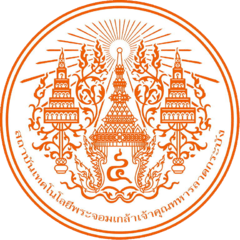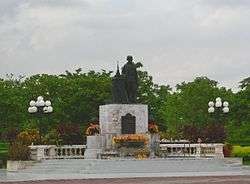King Mongkut's Institute of Technology Ladkrabang
| สถาบันเทคโนโลยีพระจอมเกล้าเจ้าคุณทหารลาดกระบัง | |
 | |
| Motto |
"Education and research on science and technology form the basis of national development" ("การศึกษาวิจัยด้านวิทยาศาสตร์และเทคโนโลยีเป็นรากฐานของการพัฒนาประเทศ") |
|---|---|
| Type | Public |
| Established | 1960 |
| President | Suchatvee Suwansawat |
| Undergraduates | 18,000 |
| Postgraduates | 2,000-3,000 |
| Location | Bangkok, Thailand |
| Campus | Suburban |
| Colors |
Orange White |
| Affiliations | ASAIHL |
| Website | www.kmitl.ac.th/ |
King Mongkut's Institute of Technology Ladkrabang (KMITL for short) is a research and educational institution in Thailand. It is in the city of Bangkok, Thailand. KMITL was founded in 1960 in Nonthaburi province as a telecommunications training center under the technical support of the Japanese government; the center was later named the Nonthaburi Institute of Telecommunications. After moving to a new location at Lat Krabang near Suvarnabhumi Airport, the campus became King Mongkut's Institute of Technology Ladkrabang.
Engineering began at KMITL in 1960 with a course on telecommunications engineering. In 1982 KMITL launched the nation's first doctoral degree in electrical engineering and awarded a doctorate in electrical engineering to Dr. Chom Kimpan, who also earned the first Doctor of Engineering granted by a Thai university. More recently KMITL has partnered with Thailand Advanced Institute of Science and Technology, a joint effort among Tokyo Institute of Technology, Thailand National Science and Technology Development Agency, KMITL and SIIT to offer international master's degree in Automotive Engineering. From its inception up, KMITL has grown to include seven faculties and affiliated research centers.
Overview

King Mongkut's Institute of Technology Ladkrabang (KMITL) is located in Lat Krabang (approximately 30 kilometres east of the center of Bangkok) and is a university with seven faculties: engineering, architecture, agricultural technology, science, industrial education, agricultural industry, and information technology.
Since a technical cooperation agreement (August 1960-August 1965) was reached between the Japanese and Thai governments in 1960 to establish a telecommunications training center in Thailand, Japan has continued the cooperation over the course of 40 years. The telecommunications training center became a three-year specialty college in 1964, and then in 1971 joined two other colleges and rose to the ranks of an institute of technology. Part of the school moved to the Ladkrabang campus, and architecture, industrial education/science, and agricultural technology departments were established.
On the Japanese side, Tokai University (1977), Tokyo Institute of Technology (1992) and University of Electro-Communications (1997) concluded academic exchange agreements with the school and assisted with such things as the expansion of the university, human resource development and research promotion as part of second phase (December 1978-August 1983) and third phase (April 1988-March 1993) “Project-type Technical Cooperation” projects. Also, a Japanese corporation funded scholarship system was established (1971), as well as practical factory-based training (1977), a construction scholarship system (1989), etc. Thus, actual cooperation activities involving linkages with industry as well as things like the start of an invitation program to the Institute for Posts and Telecommunications Policy and a human resource exchange with a public institution were promoted. Furthermore, through the “Partners Project” (1992), making use of a satellite launched by Japan, joint experiments in applied technology (areas such as distance medicine, distance education, computer networking, satellite broadcast, and joint development of a human resource training system using distance education, as well as the implementation of a continuation project called the “Post-Partners Project” (1996).
Besides this, as a way of making use of the developed skills and facilities for the benefit of other developing countries, JICA has been active in supporting KMITL in organizing “third-country training” in information technology (started in 1978; presently known as the Japan-Thai Partnership Program, JTTP; having completed 11 programs with 13 courses established), dispatched KMITL professors to the engineering department of National University of Laos and supported KMITL’s acceptance of research students from universities in Laos.
At present, KMITL has been recognized as one of the science and technology universities in Thailand. This could be because of Japan’s long-term and ongoing assistance; comprehensive assistance to the university, industry and each level of government; the significant influence of early graduates of study abroad programs in Japan. In the future, one can expect continued development through KMITL’s participation in the Southeast Asia Engineering Education Network (SEED-NET) and strengthening of links with other higher education institutions.
Faculties and departments
- School of Graduate Studies
- International College
- Faculty of Administration and Management
- Agribusiness Administration
- Management Technology
- Industrial Business Administration
- Faculty of Engineering
- Department of Chemical Engineering
- Department of Civil Engineering
- Department of Computer Engineering
- Department of Control and Instrumentation Engineering
- Department of Electrical Engineering
- Department of Electronics Engineering
- Department of Food Engineering
- Department of Industrial Engineering
- Department of Mechanical Engineering
- Department of Telecommunication Engineering
- Faculty of Architecture
- Department of Architecture
- Department of Interior Architecture
- Department of Industrial Design
- Industrial Design
- 3D-Based Communication Design
- Department of Communication Arts and Design
- Department of Fine Arts
- Department of Urban and Environmental Planning
- Faculty of Science
- Department of Biology
- Department of Chemistry
- Department of Computer Science
- Department of Mathematics
- Department of Physics
- Department of Statistics
- Faculty of Industrial Education
- Faculty of Agricultural Technology
- Department of Agronomy
- Department of Horticulture
- Department of Animal Production Technology
- Department of Animal Science
- Department of Agricultural Development
- Department of Soil Science
- Department of Plant Pest Management
- Faculty of Agro-Industry
- Department of Agricultural Industry
- Department of Fementation Technology
- Department of Food process Engineering
- Faculty of Information Technology
- Faculty of International College
- Department of Software Engineering
Centers and services
Research Center for Communication and Information Technology (ReCCIT)
The KMITL Research Center for Communication and Information Technology (ReCCIT) project is the fourth “project-type technical cooperation” project implemented at KMITL and has as its goals strengthening the center’s research and development capacity and the graduate school program. The implementing partner organizations are the Ministry of University Affairs and KMITL, and a Japan-based advisory committee (Ministry of Internal Affairs and Communications or formerly Ministry of Public Management, Home Affairs, Posts and Telecommunications; Tokyo Institute of Technology; Tokai University) has been established. Through dispatch of experts in information technology, technical training of overseas participants, provision of research and educational equipment, the goals of the project are being pursued. These are: 1) establishment of an information technology research center; and 2) strengthening of graduate school programs in the field of information technology at the Center and other research labs that are the targets of the cooperation. Through these research facilities, KMITL maintains creative partnerships with government and private industry.
Industry/University Cooperative Research Center in Data Storage Technology and Applications
The I/UCRC in Data Storage Technology and Applications or iDSTA is formed under partnership between KMITL and NECTEC under the Thailand's Hard Disk Drive Competitiveness Enhancement Program. The aim is to increase research and development activities in this area and to enhance cooperation among researchers and between the researchers and the HDD industry in Thailand.
- Advanced Research Center for Photonics
- Nanotechnology Research Center (in co-operation with NANOTECH of NSTDA)
- Business Incubator Center
- Electronics Research Center
- Computer Research and Service Center
- Electrical and Electronic Products Testing Center (PTEC) established under the co-operation of NSTDA and KMITL
- Engineering Service and Development Center
- Scientific Instruments Service Centre (SISC)
- Engineering Research Park
Campuses
- King Mongkut's Institute of Technology Ladkrabang
- King Mongkut's Institute of Technology Ladkrabang Prince of Chumphon Campus
Notable faculty and alumni
- Punya Thitimajshima - Co-inventor of Turbo code, Shannon limit-approaching code and the recipient of 1998 IEEE Information Theory Society Golden Jubilee Award
- Pirada Techavijit - First Thai to Space Selected by Axe Apollo Space Academy
- Saravoot Yoovidhya - Youngest Son of Tycoon Chaleo Yoovidhya and Managing Director of The Red Bull Beverage Co., Ltd.
- Suchatvee Suwansawat - MIT Alumnus; Dean of KMITL Engineering and Professor, Chairman of the Board, National Housing Authority; President of Engineering Institute of Thailand
- Wanpracha Chaovalitwongse - Professor of Industrial & Systems Engineering and Radiology, University of Washington, Seattle
- Agachai Sumalee - APEC Science Prize Winner, Professor of Civil and Transportation Engineering at Hong Kong Polytechnic University, China
- Thanwa Laohasiriwong - Former IBM Country General Manager
- Vatsun Thirapatarapong - Managing Director for Cisco (Thailand)
- Chaiwat Kovavisarach - CEO, Bangchak Petroleum Public Company
- Pitipan Tepartimargorn - COO and Senior Executive Vice President at PTT Public Co. Ltd
- Bundit Sapienchai - Senior Executive Vice President at Bangchak Petroleum Public Co., Ltd
- Itti Palangkool - Late pop rock singer during the 1990s
- Kongdej Jaturanrasamee - Thai screenwriter and film director
- Wibool Piyawattanametha - Top 40 Under 40 Young Scientist Selected by World Economic Forum
- Sermsak Jaruwatanadilok - NASA Scientist at Jet Propulsion Laboratory
- Yaowalak Traisurat - Miss Thailand Universe 2003
- Kokaew Pikulthong - Former Member of Parliament and Leader of National United Front of Democracy Against Dictatorship
- Songkarn Chitsuthipakorn - Former Member of Parliament
- Kongdej Jaturanrasamee - Screenwriter and Film Director
- Somsak Thepsutin - Former Vice Leader of the Thai Rak Thai Party and Former Deputy Prime Minister, Former Minister of Labour and Social Welfare, and Former Minister of Industry
- Srimuang Charoensiri - Former Minister of Education and Senator
- Putthi Tulayathun - Vice President, Mercedes-Benz (Thailand)
- Chaiyot Piyawannara - President and Country Manager, ABB (Thailand)
- Pimuk Simaroj - President of SUSCO Dealers Ltd, Former Member of Parliament and Deputy Spokesperson of Thai Rak Thai Party
- Anusorn Kraiwatnussorn - Former Member of Parliament and Vice Minister of Labour
- Somsak Phurisrisak - Minister of Tourism and Sports, Former Governor of Suphan Buri
- Songsak Premsuk - Managing Director of Voice TV
- Samai Anuwatkasem - Chairman of the Board of Metropolitan Waterworks Authority
- Nath Vongpanich - CEO of Central Familymart Company Limited
- Yongkiat Kitaphanich - CEO and Executive Director, Somboon Advance Technology PCL
- Kitisak Sriprasert - CEO and President of CAT Telecom
- Jirayuth Rungsritong - Former CEO and President of CAT Telecom
- Arnon Tubtiang - Former CEO of TOT Public Company
- Nopporn Witoonchart - CEO and Co-founder of Siam Future Development
- Pongchai Amatanon - CEO and Founder of Forth Corporation
- Polsak Lertputipinyo - CEO and Co-Founder, Stars Microelectronics (Thailand) PCL
- Pairash Thajchayapong - 2005 PICMET Leadership in Technology Management Award Recipient, Outstanding Scientist of 1991, former C11 Professor of Computer Engineering, former Permanent Secretary of the Ministry of Science and Technology, President of the National Science & Technology Development Agency (NSTDA), and former KMITL Rector
- Sitthichai Pookaiyaudom - IEEE Fellow, Minister of Information and Communication Technology, Former President of Mahanakorn University of Technology, former Professor of Electronics Engineering and former Dean of the School of Engineering and of Graduate Studies
- Sujate Jantarang - President of Mahanakorn University of Technology
- Pakorn Peetathawatchai - Executive Vice President, Head of Corporate Strategy & Finance Division, The Stock Exchange of Thailand
- Chalermek Intanagonwiwat - Computer Scientist known for his work on directed diffusion
- Wanchat Padungrat - Founder of Pantip.com
- Chusak Limsakul - President of Prince of Songkla University
Sister Universities
External links
Coordinates: 13°43′36″N 100°46′48″E / 13.726725°N 100.780125°E